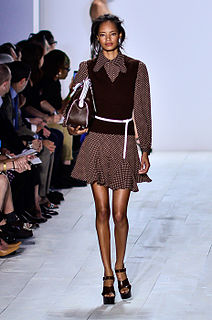A Quote by Emily Hampshire
I'm a bit fashion bipolar. I either really go for it or people think I'm a homeless person.
Related Quotes
I think fashion is really opened me up as a person. All eyes are on you when you do the shows and when you do the photo shoots. You have to know how to act around people. I used to be a shy kid in school. I didn't know how to interact with people and now I find it so easy. Fashion has really done something great for me and it's really changed me as a person. I've changed my style as well.
I learned that I suffered from bipolar II disorder, a less serious variant of bipolar I, which was once known as manic depression. The information was naturally frightening; up to 1 in 5 people with bipolar disorder will commit suicide, and rates may even be higher for those suffering from bipolar II.
I think a lot of people would assume that my job is more about supermodels and naked ladies and all that, and no, it's just really about fashion, merchandise and customers. So the obviously sexy parts - you get to go to the fashion show and all that stuff. It's really just business. That's my story. I'm sticking to it.
I think fashion is probably one of the most accessible and immediate forms of visual culture. In 1978, when I realized that I wanted to work on fashion, I had gone to Yale to get my Ph.D. in European cultural history. I suddenly realized fashion's part of culture, and I can do fashion history. All my professors thought this was a really bad idea, that fashion was frivolous and unimportant. And, increasingly over time, people have recognized that it provides such a mirror to the way we think, our values and attitudes.
I think people kind of come up and go, "Why hasn't that person busted out?" Almost always at the end of career, what you find out is that either consciously or subconsciously success hasn't happened because that person hasn't chosen for it to happen. Either through walking away because it wasn't the life they wanted or through self-sabotaging because they weren't ready.
People often think that the world fashion is so full of a certain pretense that it can't just be about going for something because it suits you and looks great, and it's nicely cut and is made of beautiful fabric. You know, if it has a bit of lightness and playfulness to it, then I think people just respond to that really well.



































